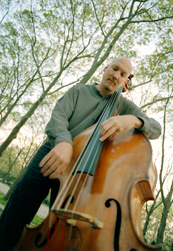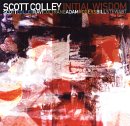

Courtesy of Scott Colley

Palmetto
A FIRESIDE
CHAT WITH SCOTT COLLEY
I saw Scott Colley with Renee Rosnes and had an inclination his maturation
would be impressive. Almost a decade later and I was proven wrong. Colley
has become one of the best bassist of his generation. Having played with
Andrew Hill, Jim Hall, and a laundry list of musicians, the bassist is
on par to become one of the best bassist of all time. I sat down with
Colley just back from one tour (Chris Potter in Europe) and off to embark
on another (Chris Potter in Los Angeles) to speak about his remarkable
progression, his new Palmetto release (Initial Wisdom), and on and on,
as always, unedited and in his own words.
FRED
JUNG: Let's start from the beginning.
SCOTT
COLLEY: Well, my older brother is a drummer. He's about six years older
than me. He first got me into listening to records and got me interested
in playing the bass. I started playing the bass when I was eleven, first
in elementary school orchestra and then started playing in bands when
I started junior high school.
FJ: Why bass?
SCOTT
COLLEY: You'd have to ask my brother. He thought it would be really cool
to have another rhythm section instrument in the family. Since he played
drums, he wanted to have a bass player brother. He talked me into it.
We played together quite a bit and he still plays too.
FJ: Listening pleasures?
SCOTT
COLLEY: When I started out, I was listening to a lot of standard bebop
stuff. I was kind of a jazz purist when I was a kid until I was about
the age of fifteen and then I discovered Weather Report and then I started
discovering the music of Ornette Coleman and a lot of other stuff. I started
realizing that there was a lot of other stuff out there that I wanted
to check out. It kind of expanded from there into what I listen to now,
which is just basically anything I can get my hands on that interests
me. In the beginning, I was really pretty close-minded. I only wanted
to listen to certain things, but those things that I listened to even
at that time, I still love now.
FJ: Influences?
SCOTT
COLLEY: I was really into Paul Chambers early on and Scott LaFaro, Charles
Mingus. It wasn't until later on, until I started expanding what I was
listening to. The first record I ever owned was what I bought because
I liked the cover. My brother took me to the record store and he said
that I could get whatever record I wanted and it was Thelonious Monk Underground.
It was that record cover with him with the machine gun and he's playing
piano. It's a very bizarre cover. That was one of my favorite records
and Someday My Prince Will Come, Miles Davis, was an early influence.
Heavy Weather, when that record came out, Weather Report record, that
was a big one for me.
FJ: Your advancement has been deliberate, far from the norm with all the
young lions hype that was rampant throughout the industry.
SCOTT
COLLEY: Well, I would never fault any musicians for jumping on an opportunity
like having a big record company interest early on, but I think there's
a, it's very important to keep an eye on the important aspects of the
music and the fact that I was lucky enough to play under some really incredible
leaders gave me a lot of time to really work on and learn from, it gave
me a lot of time to work on my craft and also the ability to observe great
leaders and see how they worked. So I can just say I was really fortunate
in that way, to have those kinds of musical relationships with people,
the importance of communication in the music, that music is a language,
and that all, what is common with Andrew Hill and Jim Hall is they're
constant ability to maintain a conversation always in the music. There
is always give and take. There is written material, but the important
aspects of their music is what happens when you're in the moment making
the music and of those surprises that come within the conversation between
the musicians.
FJ: A fellow associate and playing partner, Chris Potter, has also had
a notable evolution.
SCOTT
COLLEY: Well, we've played together consistently since we both moved to
New York at about the same time around the late Eighties. So in the middle
of all the other projects that I have done over the years, I have always
maintained at least one project working with Chris. Chris, as a part of
a larger community of musicians, of several other musicians that have
carried on that relationship, people my own age and interest and so in
a lot of ways, that New York community of musicians that I have become
a part of, I've seen it kind of grow and been able to grow because of
it, to expand. With Chris, there is always some new writing. We're always
writing and I am always listening. We're talking about music all the time.
So we grow. It grows that way.
FJ: Let's touch on Initial Wisdom.
SCOTT
COLLEY: The three of them (Bill Stewart, Adam Rogers, Ravi Coltrane),
I've been playing with different projects with them for a long time. Ravi
Coltrane, I went to school with at Cal Arts in the mid-Eighties and I
guess I hadn't played with Ravi as much. Adam and Bill, I played with
quite a bit over the last twelve years. But they are all long standing
friendships musically and personally and so I was interested in just putting
that band together. It was very easy for me to write for because I was
very familiar with their playing. Bill played on four of my records and
I have done a lot of recording with Adam also.
FJ: What characteristics do a pianoless quartet allow for you as a bassist?
SCOTT
COLLEY: Well, it gives a lot more freedom to me as a bassist to, with
my trio records with just saxophone and drums, that gives a lot of freedom
for me, harmonically and rhythmically to alter the music in different
ways, but it also adds certain challenges in terms of the responsibility
to form and the groove and forming the groove. To me as a bass player,
it is a really challenging thing for me to do, to imply a lot of harmony
and rhythmic stability that you can get, normally, from chord instruments.
In that situation, that's the certain challenge that it has for me. I
really wanted, with this new record, I wanted to try doing a record with
guitar because my other records had either been trio or the sextet record
that I did before was with piano. There is a lot of textures that you
can explore with guitar, especially with Adam, his incredible range of
sounds from nylon strings or classical guitar or electric guitar with
effects. He's got a real range and I kind of wanted to write for that
and to experiment with that.
FJ: And the future?
SCOTT
COLLEY: Well, Chris Potter's quartet will be touring. We just did a new
record that is coming out this month. I will be in LA for the first two
nights at the Bakery and then the other thing that I am touring with this
fall is Herbie Hancock's quartet with Terri Lyne Carrington and Gary Thomas.
We just did our first rehearsals and concerts and it sounds great. It's
very open. It's really incredible. I think it will be a lot of fun. It
is a brand new quartet.
Fred Jung is the Editor-In-Chief and belives this season of The Sopranos
is the best one. Comments? Email
Him